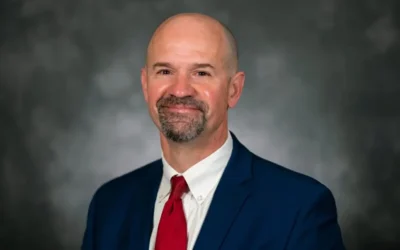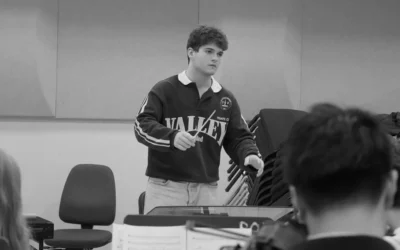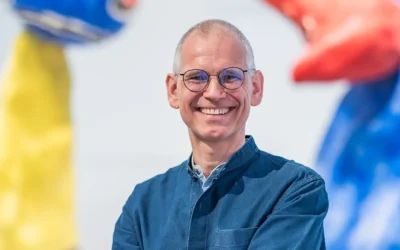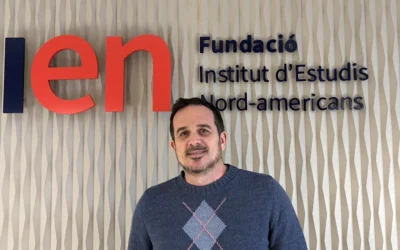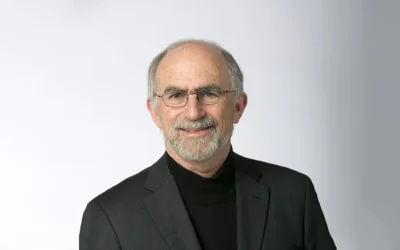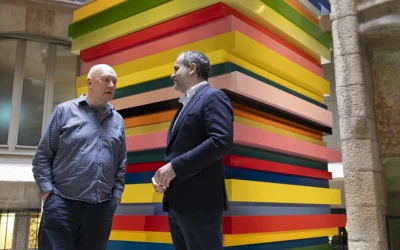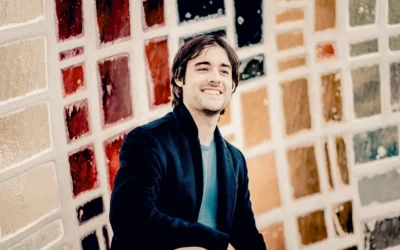Jordi Albó: “While in Boston, we help create technologies that cause positive impact in Barcelona”
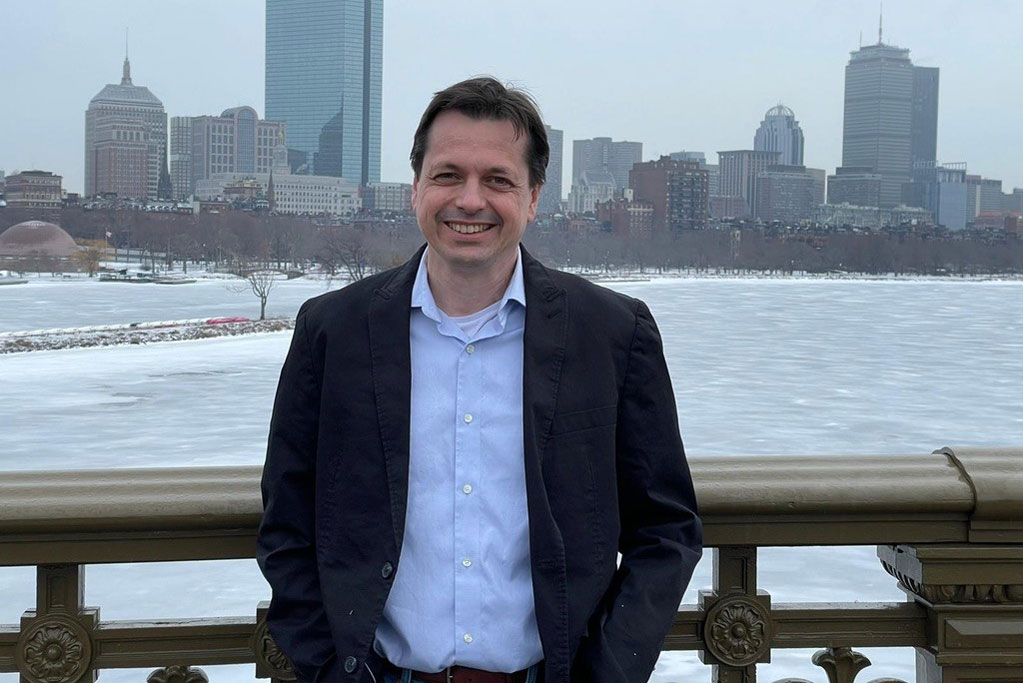
By Marc Amat
For many years, Jordi Albó has been working to improve the quality of life of people through technology. He was born in Arbúcies (Girona) but his extensive academic studies and career in education were carried out in Spain, Holland, and the United States, during which time he attempted to contribute to the transfer of knowledge from the educational sector to the business ambient. He promoted projects based on artificial emotional intelligence and cloud computing platforms that have since been deployed within both teaching and healthcare environments. His current focus is on the company he cofounded, Lighthouse. Based in Boston, where Albó also lives now, the company is also present in Barcelona where it draws from the innovative talent of the American city in order to address the challenges and necessities of southern Europe, Africa, and Latin America.
After years working all around the world, you decided to put down roots in Boston.
Yes. It is an amazing, inspiring city that is full of talent and opportunities. In 2019, it became clear to Esteve Vilella, Parfait Atchadéit, and myself that the capital of Massachusetts had the ideal ecosystem for founding Lighthouse, a project that we had had in mind for some time. We wanted to create a business that guided entrepreneurial individuals through the journey of developing their disruptive ideas. However, at the same time, we also had the ambition to have it cover the needs of other territories that did not have such advanced entrepreneurial systems. Personally, my great dream has always been to improve Catalonia, but over the years it became clear I could only achieve that goal if I went somewhere else. That is why we at Lighthouse have opened a branch office in Barcelona through which we are in contact with and enrich both ecosystems of innovation: that of Catalonia and that of Boston.
They are two very different settings in which to innovate though. What makes them different?
I absolutely agree. To start with, there are significant cultural and religious differences that condition how you do business in one place and the other. When we first arrived in Boston, we were welcomed with open arms. Right from the start they provide you with a high degree of confidence and if you show that you are truly not wasting their time, they will help you carry out your project without any hesitation. They know that if they accompany you towards success, they too will receive positive repercussions from that success. The formula is: thanks to their support, you enrich the ecosystem of the city and in return the enriched ecosystem benefits them as well. In Catalonia, things are quite different. The cultural tradition has shaped how new enterprises are undertaken. There is a culture that places individual enrichment over the common good along with an enormous aversion to any risk, even though entrepreneurship is precisely the act of taking risks. In Boston, making mistakes is seen as a success since it allows you to learn and keep evolving. In Catalonia it is a failure.
Even so, you have adapted very well.
I’ve always been told I have a very American mentality. The key is to know what it is you want and to do all you can to achieve it. I try to participate in all the projects that interest me and leave myself a lot of freedom. It is important not to be too disciplined in the field of entrepreneurship. It is not very useful to plot out plans and design strategies five years ahead of time, since everything changes so quickly. An entrepreneur never likes to be told exactly how to do things and, in Catalonia there is a tendency to want to control such people.
Nevertheless, there are bridges between Barcelona and Boston that are flourishing, and you contribute to them. How is the Catalan innovation ecosystem perceived from over there?
Catalonia is seen as a land of opportunities. However, there are still two major pitfalls that need to be worked on. First of all, there are the bureaucratic difficulties involved in building a business and importing foreign talent. In the United States, there rules are very clear. If you fulfill them, you and come to contribute something, you are welcome. There, we put together Lighthouse in one week, while in Catalonia, getting the subsidiary company running took six months. The other challenge that must be overcome is the constant change in laws. In Boston, when the rules of the game change, they advise you very far ahead of time and always take into account that you began your activities with the prior rules. Here, that is not the usual case.
You have dedicated many years to the transfer of knowledge between the world of the university and the business sector, both here and in Boston. Did you find differences between them too?
Many of them. The transfer of knowledge is radically different between them. In Boston, the interaction between the two worlds is far more elevated. In fact, in the United States, they promote entrepreneurship while still in school. Many young people dream of becoming entrepreneurs. Entrepreneurship is everywhere. It is instilled in their DNA. Even being sick is an exercise in entrepreneurship: you have to have enough resources to complete all the actions that are required so that your state of health improves within a specific timeframe. On the other hand, in Catalonia, one of the most common aspirations found within classrooms is to be a civil servant. However, beyond that, the actual ecosystem in Boston is very much in favor of the transfer of knowledge. Many people have realized that the city is an enormous talent hub and ever more people are seeking to associate themselves with this talent in order to push their ideas forward. To put it in other words: the presence of talent means that a natural transfer of knowledge occurs between universities and companies. In Catalonia, the ecosystem has not yet become attractive enough and the existence of companies that can generate money thanks to their links to the educational sector is not something that is looked upon approvingly.
Beyond the relationship between the university and business sectors, Lighthouse is also pushing to create links with the Catalan health care sector.
Yes. For example, Barcelona’s Hospital Sant Joan de Déu asked me to analyze how we could take advantage of the knowledge that was being generated in Boston with eyes on solving some of the needs that the center has. They realized that having to undergo a medical operation generated a great deal of stress in the children that needed it. That in turn could cause chronic pain and the need to medicate the children. To alleviate the stress of that situation, we proposed having a remote-controlled toy car with a child inside that would take them on the trip to the operating room. We developed it into a project and went searching for companies in Boston that would be willing to finance it. Shortly thereafter, we created an alliance with Hyundai. The result will be a car for children stuffed full of sensors and activators that through the use of artificial intelligence allow the state of the child to be continuously monitored and help reduce the anxiety and stress the child might experience. People from a number of nationalities loaded with talent worked on the project, with Boston being the meeting point and Barcelona as the city where the project would be deployed. It is an example of how we can help develop technologies in Boston that generate positive impacts in Catalonia.
There are people of many nationalities in Boston. Has it also been a big destination for Catalan talent?
It sure has. In fact, it is quite usual to be out shopping at the supermarkets or go into a café and hear someone speaking in Catalan. Culturally, Boston and Barcelona are two cities that have points in common. Many of the Catalans who are unsatisfied with their lives and make the decision to leave Catalonia end up in Boston. They feel they are more valued here than they are there. It is a pity, because it is a clear example of “brain drain”. In Barcelona, these individuals would greatly enrich the innovative ecosystem of the city, but the fact is that bringing projects to light in the Catalan capital remains very complicated. I miss Catalonia every day, but I will remain in Boston for many years. Going back home would mean going from a place I can drink as much water as I like to a place where I must make do with four drops a day.
